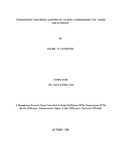| dc.description.abstract | Uchumi Supermarket limited was a public limited company incorporated in 1975 under the
Companies Act. In early 2000s it started to experience financial and operational difficulties
which resulted in a marked diminution of the Company's resources consequently it was unable to
meet its financial obligations. On 31st May 2006, the Board of Directors resolved that the
company ceases operations and on 2nd June 2006, the Debenture Holders placed the Company
under receivership. Following a framework agreement between the Government of Kenya,
suppliers and debenture holders, the company was revived and commenced operations from 15th
July, 2006 under Specialized Receiver Manager and interim management. By the end of 2008
financial year, Uchumi returned a profit of Kshs 106 million against a loss of Kshs 257 million
the previous year marking a turnaround of Kshs 356 million. This study was set out to establish
and document the turnaround strategies adopted by Uchumi Supermarket Ltd (under
receivership). The objectives of this study were to determine the main causes of business decline
at Uchumi Supermarket Ltd. and to establish the turnaround strategies employed by Uchumi
Supermarket Ltd (under receivership). The research was a case study which utilized primary data
collected through personal interviews. Secondary data also was used to supplement the primary
data. Content analysis was used to analyze the data collected. The analysis showed that the
company had faced by various problems i eluding high amounts of unpaid debts, unplanned
expansion projects, conflict of interest among the board members, cash flow imbalances,
corruption, lack of operating capital, low price competition and monopolistic mindset. The
interim management team put together Uchumi Recovery Plan which included a combination of
turnaround strategies to rescue the company from total collapse. These strategies included
recapitalization, cost management, improved customer service, maximization of sales revenue
and business reorganization and restructuring. The study concluded that for a successful
turnaround to occur a combination of turnaround strategies should be implemented together
depending on the causes of business decline. Company stakeholders play a major role in the
revival of the business and when a firm is faced by performance crisis it should consider
replacing the existing top managers and hire an experienced managerial team to steer the
turnaround process | en |

